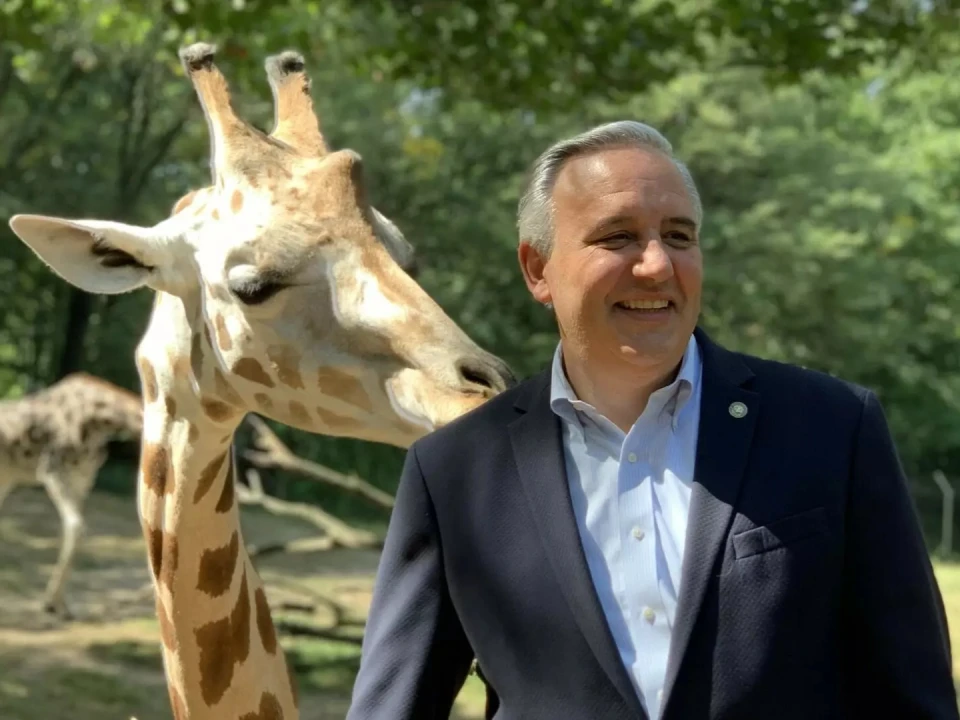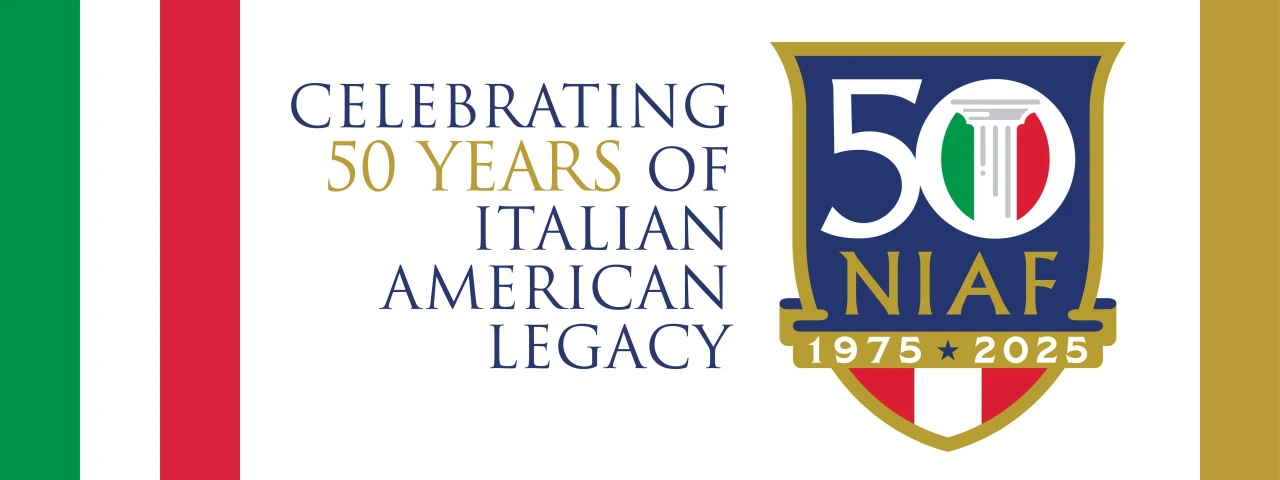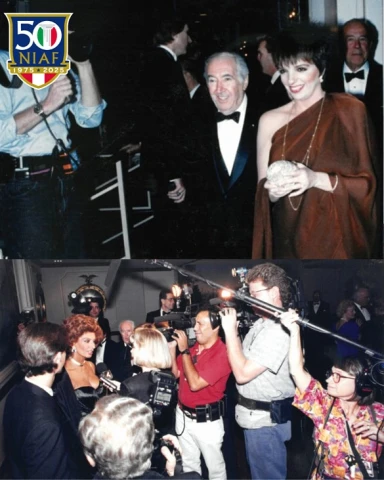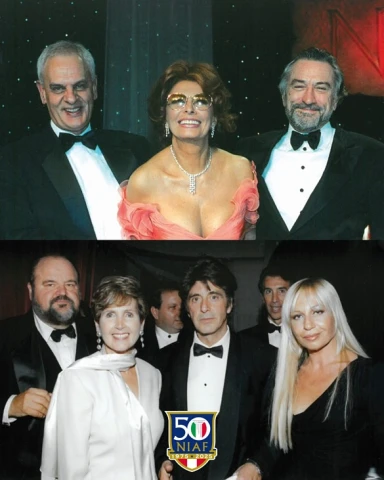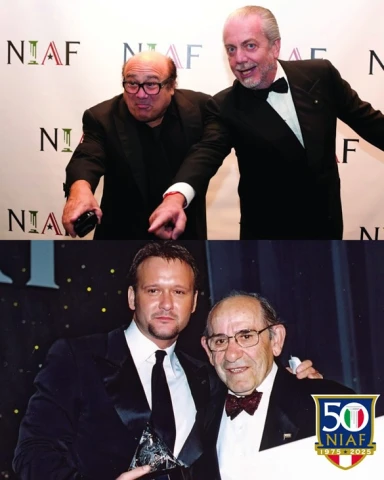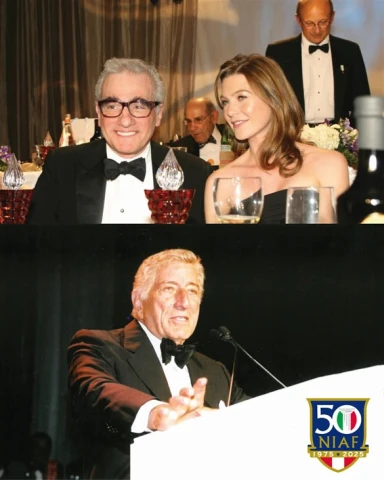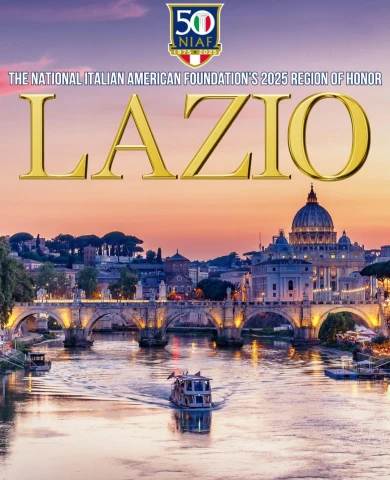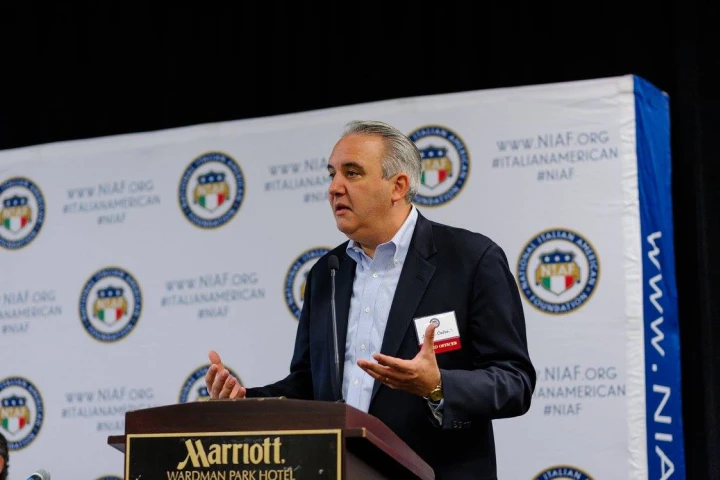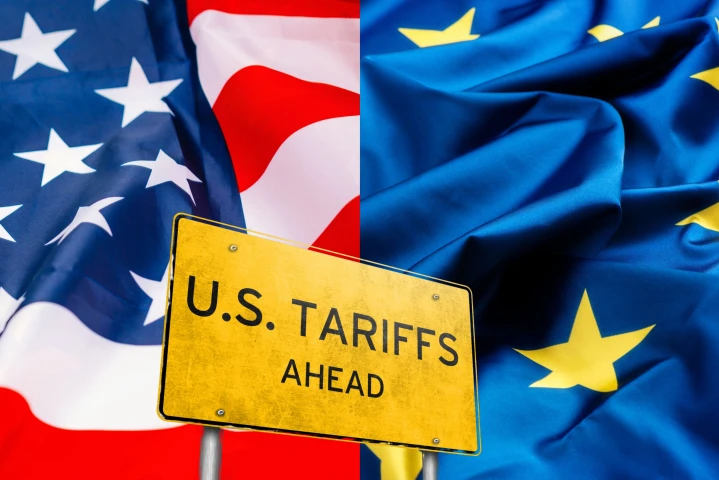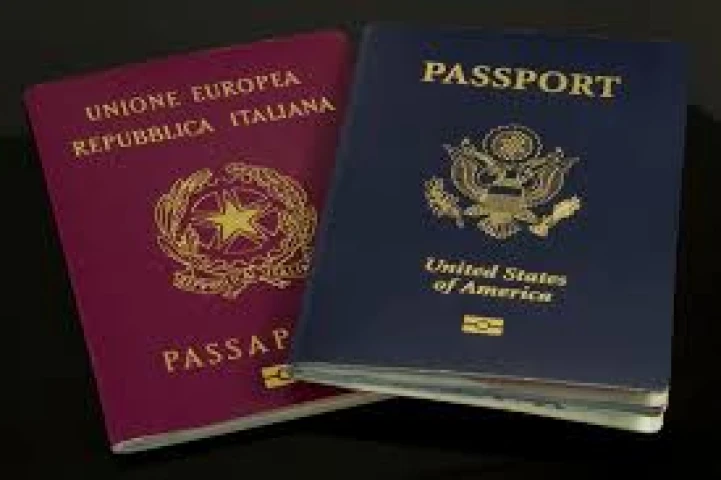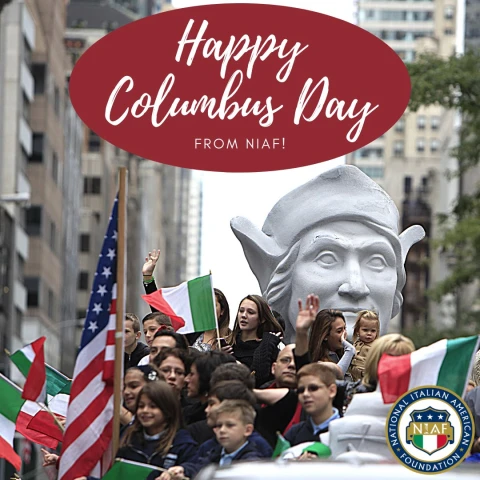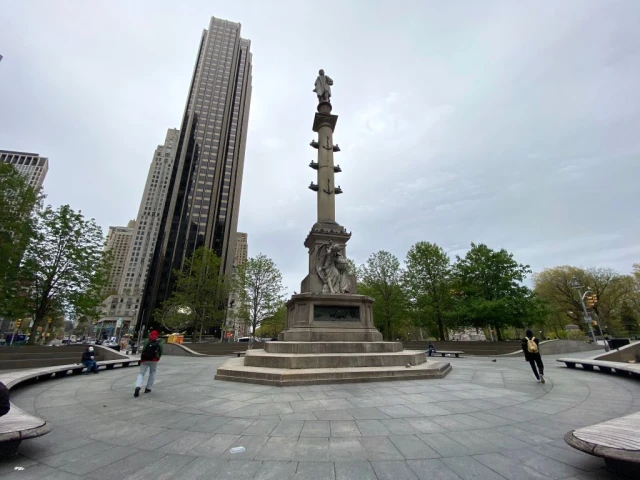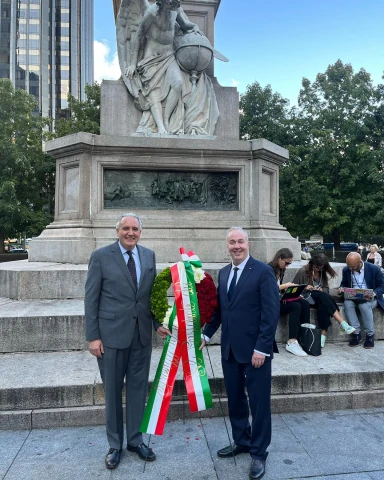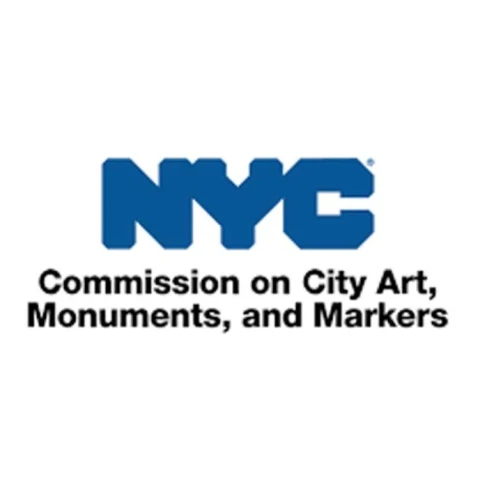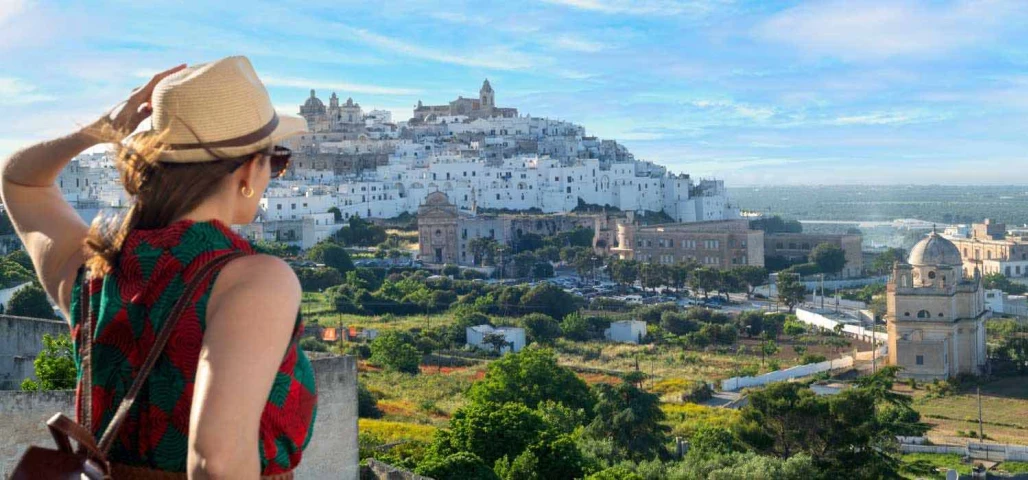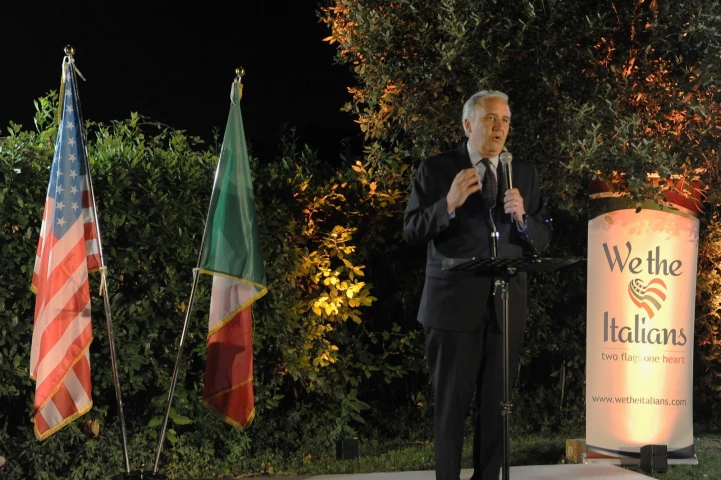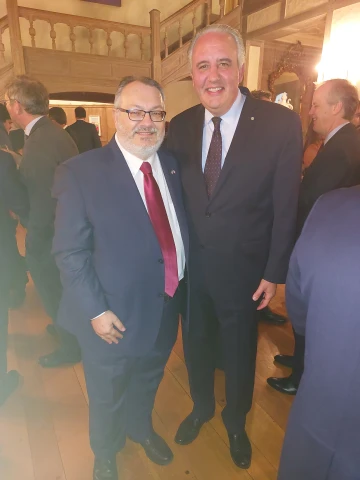NIAF (National Italian American Foundation) is the most important organization representing the Italian American community, and this year it celebrates its 50th anniversary. 2025 is also a year of change for its Chairman of the Board, and since last April, this crucial role has been held by one of the best people I know: John Calvelli.
John is an extraordinary leader with many qualities, the perfect person to lead the NIAF board during this anniversary and in this period of revolution in the relationship between Italy and the US. Navigating these times is complicated; we all need leadership, competence, intelligence, and passion. Kudos to the NIAF friends for choosing a leader who embodies these qualities.
Good morning John, welcome back to We the Italians and congrats on your absolutely well-deserved appointment. I would like to start by asking you about your family's origins: which part of Italy are your roots from?
My parents are both from Calabria, from a small town called Vico di Aprigliano, right at the foothills of the Sila mountain. They emigrated to the United States at different times: they were referred to as “birds of passage”. On my father’s side, my great-grandfather and my great-great-grandfather came to America and then went back, then my great-grandfather came back here in the US and he passed away, so my grandfather in Italy was an only child. The idea of America was very traumatic for him.
On my mother's side, the situation was very similar. My great-grandfather came here, my grandfather came here, but again back and forth, back and forth.
My mother was in Italy during World War II and then was able to come to America in the in 1947. I always share her story because I think it is very telling of the American experience, especially during that time. Her father, my grandfather, had a dairy farm in upstate New York and it was a small community that was made up of mostly Dutch-German farmers that had come over in the 17th century. In that community there were a few Italian immigrants like us, and then there were Jewish children who had lived through the Holocaust, so I get very emotional thinking about it. My mother was in a one room schoolhouse with these children, she had been in America only three months and was taught the Pilgrim's Pride so that they could recite it at Thanksgiving. Being accepted into this community and living the tragedy of leaving Italy and the difficulties was hard for her, but then she was able to put all of this in context by seeing it within the eyes of these children, who by the grace of God were still alive and able to come to America, where they were given an opportunity to start a new life.
When I was a child, we moved back to Italy, because my mother and especially my father felt that it was important to try to return. But then, after nine months, he realized that that was not the appropriate thing to do. So we spent about a little under a year and a half in Italy. I went to kindergarten in Calabria and then we came back to America. And I, again, have this very, very vivid immigrant experience where I left by boat and came back by boat and my father was waiting for us at the pier in Manhattan. So I remember this sense of reconnecting to the United States after having lived overseas, I feel that I have lived in a very real way that immigrant experience.
2025 is an important year: NIAF, of which you have just been named Chairman of the Board, is celebrating its 50th anniversary. Through you, we extend our congratulations to everyone who is currently part of, or has been part of, this extraordinary organization. Could you share with our readers the story of these first 50 years?
We have to always put all of this in context and go back to 1975 and fully understand the Italian American experience at that time; where were as a community, what was needed and what was required.
I think what NIAF did was to fill a need that is still very relevant 50 years later, which is to have a voice for the Italian American community in Washington, DC to serve as the secretariat for the Italian American congressional delegation, to be this bridge between the United States and Italy where we respected, promoted, and preserved the past but really look at the present and towards the future so that we would build stronger linkages between our two nations.
That vision of 1975 is the same vision of 2025, and through different moments in time, we can look at different things that we have accomplished. So, for example, we've been very active on Capitol Hill providing policy recommendations and briefings, bringing Italian and Italian Americans together with leaders in various fields.
We have been supportive of Italy in moments of crisis in terms of what was happening during natural tragedies that hit Italy in the last 50 years.
But I think one of the most important thing from that period was this idea that Italy was a bulwark for social democracy and that we wanted to make sure that those linkages between the United States and Italy were strong, especially during the period of the Cold War. Now we fast forward 50 years and Italy is now a leader in Europe as it was then, but even more so now, it is seen as a staunch ally of the United States on the front lines of many crises around the world. In every international scenario, Italy has a voice and a seat at the table. And I would rather, as an American, see Italy in line with us and we in line with Italy because we are stronger together than apart.
If we think about all of these various components, we realize where are today, also thanks to 50 years of commitment of NIAF. I think I have been to every NIAF gala since 1985. So I have been going for 40 years. And the power of seeing the President of the United States, the Prime Ministers of Italy, leaders from Italy coming together and reinforcing and reaffirming that connection between our two nations, that alone would be enough. I can clearly see the big importance of these moments where people come together to share what their vision and mission is. So if we just did that, that would be exemplary, but we do obviously much more than that.
In the last five years we have seen this real move towards leadership thanks to the relationship with The European House Ambrosetti, identifying issues that need a bit more definition, exploration, data. That has been an eye-opener for us because we learned so much about who we are and also how to strengthen those bonds.
When we talk about these linkages between Italy and the United States, they come in different levels or different forms. We have historically talked about the cultural connections and historical connections, and that needs to be continued because as much as I admire other languages, Italian is the language of culture. So that is one very important pillar, and we have signed an agreement with the Dante Alighieri Society to help expand the opportunities to learn the Italian language in the US.
How and when will you celebrate this important anniversary here in Lazio, your region of honor this year?
What better region to have as our region of honor than the one where the capital of Italy is, the political center of Italy... and obviously we will also celebrate Rome in Washington, D.C. in October 2025. While we are in Rome, we will be meeting with regional and national business, civic and political leaders.
We are excited to continue to celebrate and to identify new ways of working together. In April we had our New York gala and together with it we had our business conference with the Lazio region. It was fascinating because we did a mini Shark Tank, which is an American program where people come and “pitch” their product or their company in a compressed timeframe. We did that with a series of Italian companies from Lazio with these young, dynamic, passionate leaders, business leaders who are trying to make their mark. If we, as Italian Americans, can support that, we are all better off because the products that they are promoting will make life better, not just for Italians, but for Americans and the whole planet.
What are the goals you have set for the years you will be Chairman of the Board?
I think that the best answer I can give you is to read you a part of my speech at the board meeting that elected me.
Our heritage is the glue that binds us. And we believe fervently that our shared heritage is of inestimable value. Our experiences in this great nation have shown what can be accomplished by an immigrant community. Our brothers and sisters in Italy have been a beacon for us, uniting our two nations under a shared set of values that makes us both nations, makes both nations stronger.
But being here is already a statement. Everywhere around this table is a leader. Leadership is an honor and a duty. The honor to serve our community and the duty to serve the mission. Simple yet audacious goal for me is to build a pathway to the future. And to do that, I mentioned three goals.
Number one: how do we make sure that our nations and our community have the leadership they require to thrive? We need to continue to identify and nurture those future leaders. I shared a photo of me at NIAF at 21 years old, 40 years ago. And I said to myself, if my 21 year old self were here now, he would ask for one thing. Don't forget the youth. They are our future. Now that I have assumed this role, I hope not to let him down. So that is number one, this idea of looking to the future and engaging young professionals.
Number two: promoting our language, ensuring that our culture is not lost.
Number three: ensuring the financial stability and growth of the organization.
And then I asked a simple question, can I actually accomplish this? And the simple answer is no. I cannot do it alone. In the words of our colleague Giovanni Colavita, “alone you go fast, together we go farther”. So I am incredibly optimistic that together we can go farther, building upon the incredible work that has already been accomplished.
NIAF has been on this journey for 50 years. What will the next 50 years bring? What we do together in the coming years will help answer that question. I look forward to being on this journey with all of you.
That was part of my little speech when I accepted.
It seems that, even without any political judgment, we can say that this year, the relations between the United States and Italy, as well as with Europe, are rapidly evolving into something very different from what they have been in recent decades. What are your thoughts on this?
I think that the only constant in life is change. So I think relationships evolve, and change. But if the fundamental values and the bedrock of the relationship are there, then we will work through those changes. And my hope is that we will come out stronger on the other end. But there is no doubt that we are in a moment of change. That is probably as far as I would want to go at this point. But I think that for the last 80 years there has been an understanding of the importance of this transatlantic relationship. And I think we can see that even more today. Moving forward, Italy is not the same Italy of 1948. So therefore, Italy has changed and evolved. The United States has changed and evolved. And I think that as long as there are people of goodwill, and I believe that there are on both sides of the Atlantic, and there are organizations like the National Italian American Foundation, I think we are in a much stronger position to help ensure that those bonds stay strong and that we stay united.
One of the latest issues that has greatly concerned the Italian American community is the recent decree on dual citizenship, which risks leaving millions of Italian Americans without the official recognition of something that is already real in their hearts: that they are Italians. What does NIAF think about this, and what are you doing about it?
Having spent my life in government and being counsel and chief of staff of a Congressman on the foreign affairs committee, I have been around international politics pretty much my whole life. And therefore, I come to this with a deeper appreciation of what Italy is going through.
What does that mean? Number one, the challenges in South America, especially with the huge number of people that have been applying. That is a reality. All I can speak to is what I have read, but the numbers are staggering. I think that Brazil alone has 100,000 applications in progress. And I have also learned that in the Veneto region, I believe 80% of all of the work being done at the local judicial level is literally on citizenship. So I appreciate the challenges and I appreciate the concern.
As an Italian American, we have a bit of a different reality here whereby I think there is over 10,000 people in the New York Italian Consulate alone that are waiting for their papers to be processed, so therefore there is a significant number here as well. Here in the United States, the idea of being Italian from the very beginning has been the idea that you are linked to Italy, and that link continues through the generations.
It is a situation that is untenable in many respects. My response to that is, let's figure out how to fix the system, how to make the system more efficient, ways and modalities that will make life easier for the people trying to apply and for the Italian Government. So that would be my first reaction to those issues.
The second, which I think is also a challenge, is going back so many generations, could you see going back, as opposed to five or more, three or four? I think there is a middle ground between what is being suggested now and where we were before. And I think like-minded people of goodwill can come together and find that middle ground.
Then you also look at these people that have spent a significant amount of money and shown their interest. I have one case of a friend, literally two years on the waiting list: two years! There is something fundamentally wrong. As an Italian and an Italian American, one of the things that we pride ourselves on is respect, but more importantly is fairness. And it just doesn't seem fair to these people that have really expressed that will of being Italians.
On top of that, there is a whole other group of people, my parents included, that had to renounce their citizenship in order to get American citizenship. These people were and are very connected to Italy, but had to give up their Italian citizenship because of the laws in the country where they were living, where they had to go to create a new life for themselves.
So what is NIAF doing? What we are doing is what we always do. We are bringing this issue to the attention of the Italian American Congressional Delegation to inform our elected officials that this has a significant impact on thousands, if not millions, of their constituents. Also, we are in dialogue with the Italian government and senior leaders in the Italian Parliament to share our perspective on what's happening. We also very much understand this is an Italian issue that needs to be dealt with by Italians in the Italian government, but obviously we should have a voice and an opportunity to voice our concerns.
NIAF has been doing that literally from the moment in March that the decree was proposed by Foreign Minister Tajani. Our leaders are working on this matter and providing appropriate input.
And then, of course, we have the connection with the Italian Embassy in Washington: we have been in constant dialogue with them as well. People are hearing us and understand the concern that good people are being negatively impacted.
Another delicate and important issue is the one concerning Christopher Columbus. You have always fought in his defense, achieving great results in his favor, both in New York City and beyond. Do you believe there is a future in which this campaign against the man that many Italian Americans have chosen as their hero will come to an end?
First of all, every community needs to be vigilant to make sure that they are telling their story in an authentic way and not having their story told by others. That is the most important thing. We need to be able to have a seat at the table to tell our story and share who we are and what we do.
I served on the New York Monuments Commission at a very difficult time, and I was able to bring along and help educate members of that commission that when they entered the room were not supportive and wanted to get rid of the Columbus statue in Columbus circle, and then at the end voted to maintain it. I want to be very clear. That is an important statement about the need to have the ability to sit down and break bread and dialogue with people. It was not unanimous, but it was a victory for us and a victory for what I feel is common sense.
I think that Columbus Day is a day for Italian Americans to celebrate their pride and their heritage, a day that celebrates when the Columbian Exchange began, that this radical moment that changed world history. If we think about a few moments in time that changed world history, obviously people would say the birth of Jesus Christ, Muhammad, the Buddha. These are elements from a religious context that you could say were life-global changing. Who can argue that Columbus' arrival in America did not change the history of the world? It is a fact, and I would say, on balance it changed it for the better. With that arrival, there is good and there is bad. I am willing to articulate that good things and bad things happen, that we have a responsibility to tell the complete story.
What is also important as we are telling that story, is that this is a 15th-century explorer. This is not a 21st-century New Yorker. The arc of justice has curved toward greater respect for civil rights in these past five centuries. So understanding that there are 500 years between his reality and our reality, let's have a conversation. Let's talk. Let's understand where we are. Let's appreciate these various components.
What I said to the people on that commission, and I say it today, is that eliminating that statue is eliminating my heritage as an Italian American and my heritage as a Catholic, because people seem to forget that the Ku Klux Klan and the more radical elements in our society were against Catholics and against Jews and immigrants and targeted Columbus as a symbol to be eliminated.
And then, who paid for many of those statues? It was our grandparents and great-grandparents that were looking for respect and to be accepted in this country. For them, celebrating Columbus Day meant to reaffirm their rightful place in this country.
NIAF is the most important, powerful, and structured association representing the community of millions of Italian Americans. What can Italy do to send a further signal of recognition and appreciation to all of them?
I will tell you that I am incredibly blessed to see the relationship between the United States and Italy blossoming over the 35 years that I have been involved. During this time, I have seen the Italian government become even more engaged with local communities and looking for ways of increasing those ties. So, I would just say, thank you, on one level.
On another level, I would say, let's keep making that happen. I would also say that the responsibility the Italian government has is really to help promote the language and culture globally, and you look at that, and we need to be doing more of that, not less. If we look at what France, China, Germany and others do, Italy needs to find more ways to continue to expand access and interest in the language and culture.
Also, we need to keep building the business linkages between the United States and Italy, and we are doing it: it is happening, and again, the one constant is change. The business environment changes every day. The opportunities change every day, so we need to be agile and work together with the Italian government and with the American business community, and that is one of the great skills and abilities that NIAF has.
I'm very appreciative of what the Italian government and the Italian communities at large have done. I would love to find new and interesting ways to expand more: for example, I am thinking about the Roots Tourism. I find that to be an incredibly powerful way of building linkages. I have done that for a couple of my friends. I have assisted them as they returned to their ancestral home towns. It is life-changing. It helps put all of this other work in perspective on why we care about Italy. One of our NIAF challenges over the next four years will be finding more ways to do that. But it is literally not just our challenge, it is really a community challenge, and I would be remiss if I didn't say that we have been fortunate to partner with incredible Italian American organizations, such as the Order of Sons and Daughters of Italy, UNICO, the National Organization of Italian American Women and the Columbus Citizens Fouundation. We have really found common ground with these organizations. There is a unity of purpose and a shared vision to move forward.
I’ll repeat the question, but on a much smaller scale: what can We the Italians do to better promote here in Italy the importance of the Italian Americans?
I think the interesting question with media today is: are they just a megaphone? I would strongly suggest they have to be a megaphone, but also what you and I are doing here, this conversation, asking critical questions to help move the conversation forward. We need to have the ability as Italians and Italian Americans to reflect and have a period of self-assessment. What is working, and what is not? Why should we be doing this over that? It is important for us as a community, on both sides of the Atlantic, for our own growth and maturation.
Therefore, my answer to you is: keep doing what you are doing!
La NIAF (National Italian American Foundation) è la più importante organizzazione in rappresentanza della comunità italoamericana, e quest’anno compie 50 anni. Il 2025 è anche un anno di cambio del suo Chairman of the Board, e dallo scorso aprile questo fondamentale ruolo è ricoperto da una delle migliori persone che io conosca: John Calvelli.
John è uno straordinario leader dalle tante qualità, la perdona perfetta per guidare il board della NIAF in questo anniversario, e in questo periodo che vede una rivoluzione dei rapporti tra Italia e Stati Uniti. Navigare questi tempi è complicato, tutti noi abbiamo bisogno di leadership, competenza, intelligenza e passione. Bravi gli amici della NIAF a scegliere un leader che rappresenta queste qualità.
Buongiorno John, bentornato su We the Italians e congratulazioni per il tuo meritatissimo incarico. Vorrei iniziare chiedendoti delle origini della tua famiglia: da quale parte d'Italia provengono le tue radici?
I miei genitori provengono entrambi dalla Calabria, da un piccolo paese chiamato Vico di Aprigliano, proprio ai piedi della montagna della Sila. Sono emigrati negli Stati Uniti in tempi diversi: venivano chiamati “birds of passage”. Da parte di mio padre, il mio bisnonno e il mio trisnonno vennero in America e poi tornarono, poi mio bisnonno tornò negli Stati Uniti e morì, quindi mio nonno in Italia era solo. L'idea dell'America fu per lui molto traumatica.
Da parte di mia madre, la situazione era molto simile. Il mio bisnonno venne qui, mio nonno venne qui, ma anche lui, avanti e indietro, avanti e indietro.
Mia madre era in Italia durante la Seconda Guerra Mondiale e poi riuscì a venire in America nel 1947. Racconto sempre la sua storia perché penso che rappresenti molto bene l'esperienza americana, soprattutto in quel periodo. Suo padre, mio nonno, aveva una fattoria di latticini nello stato di New York ed era una piccola comunità composta per lo più da agricoltori di origine olandese e tedesca che erano venuti nel XVII secolo. In quella comunità c'erano alcuni immigrati italiani come noi, e poi c'erano bambini ebrei che avevano vissuto l'Olocausto, quindi mi emoziono molto a pensarci. Mia madre era in una scuola con una sola stanza con questi bambini, era in America da soli tre mesi e le insegnavano la "Pilgrim's Pride" per poterla recitare a Thanksgiving. Essere accettata in questa comunità e vivere la tragedia di lasciare l'Italia e le difficoltà è stato difficile per lei, ma poi riuscì a mettere tutto questo in prospettiva vedendolo attraverso gli occhi di questi bambini, che per grazia di Dio erano ancora vivi e potevano venire in America, dove avevano l'opportunità di iniziare una nuova vita.
Quando ero bambino, ci trasferimmo di nuovo in Italia, perché mia madre e soprattutto mio padre ritenevano che fosse importante provare a tornare. Ma poi, dopo nove mesi, si resroe conto che non era la cosa giusta da fare. Quindi trascorremmo circa un anno e mezzo in Italia. Andai all'asilo in Calabria e poi tornammo in America. E io, di nuovo, ho questa esperienza molto vivida di immigrato dove partii in barca e tornai in barca e mio padre ci aspettava al molo di Manhattan. Ricordo questo senso di riconnettermi agli Stati Uniti dopo aver vissuto all'estero, sento di aver vissuto in modo molto reale questa esperienza di immigrato.
Il 2025 è un anno importante: la NIAF, di cui sei appena stato nominato Chairman del Board, festeggia il suo 50° anniversario. Attraverso te, estendiamo le nostre congratulazioni a tutti coloro che fanno parte, o hanno fatto parte, di questa straordinaria organizzazione. Potresti condividere con i nostri lettori la storia di questi primi 50 anni?
Dobbiamo sempre mettere tutto questo in contesto e tornare al 1975 e comprendere appieno l'esperienza italoamericana di quel tempo; dove eravamo come comunità, cosa serviva e cosa era richiesto.
Penso che ciò che la NIAF ha fatto è stato colmare un bisogno che è ancora molto attuale 50 anni dopo, ossia avere una voce per la comunità italoamericana a Washington, fungere da segreteria per la delegazione parlamentare italoamericana, essere questo ponte tra gli Stati Uniti e l'Italia dove rispettavamo, promuovevamo e preservavamo il passato, ma guardavamo davvero al presente e al futuro in modo da costruire legami più forti tra le nostre due nazioni.
Quella visione del 1975 è la stessa visione del 2025, e attraverso diversi momenti nel tempo, possiamo guardare a cose che abbiamo realizzato. Ad esempio, siamo stati molto attivi lavorando con il Congresso degli Stati Uniti fornendo raccomandazioni politiche e briefing, mettendo insieme italiani e italoamericani con leader in vari settori.
Abbiamo supportato l'Italia nei momenti di crisi riguardo a ciò che accadeva durante le tragedie naturali che hanno colpito l'Italia negli ultimi 50 anni.
Ma penso che una delle cose più importanti di quel periodo sia stata questa idea che l'Italia fosse un baluardo a favore della democrazia e che volevamo assicurarci che quei legami tra gli Stati Uniti e l'Italia fossero forti, soprattutto durante il periodo della guerra fredda. Se facciamo un balzo in avanti di 50 anni, l'Italia è ora una leader in Europa come lo era allora, ma ancora di più adesso, viene vista come un alleato fedele degli Stati Uniti in prima linea in molte crisi nel mondo. In ogni scenario internazionale, l'Italia ha una voce e un posto al tavolo delle decisioni. E io, come americano, preferisco sempre vedere l'Italia allineata con noi e noi allineati con l'Italia perché siamo più forti insieme che separati.
Se pensiamo a tutti questi vari componenti, ci rendiamo conto dove siamo oggi, anche grazie ai 50 anni di impegno della NIAF. Penso di essere stato a tutte le cene di gala della NIAF dal 1985. Quindi vado da 40 anni. E il potere di vedere il Presidente degli Stati Uniti, i Primi Ministri italiani, i leader dall'Italia venire insieme e rafforzare e riaffermare quella connessione tra le nostre due nazioni, quello da solo sarebbe sufficiente. Posso chiaramente vedere l'importanza di questi momenti in cui le persone si uniscono per condividere quale sia la loro visione e missione. Quindi se avessimo fatto solo questo, sarebbe stato esemplare, ma ovviamente facciamo molto di più.
Negli ultimi cinque anni abbiamo visto un vero e proprio movimento verso la leadership grazie alla relazione con The European House Ambrosetti, identificando questioni che necessitano di una definizione maggiore, esplorazione, dati. Questo ha aperto ancora di più i nostri occhi perché abbiamo imparato tanto su chi siamo e anche su come rafforzare quei legami.
Quando parliamo di questi legami tra Italia e Stati Uniti, essi si manifestano a vari livelli o in diverse forme. Storicamente abbiamo parlato di connessioni culturali e storiche, e questo va continuato perché per quanto io ammiri altre lingue, l'italiano è la lingua della cultura. Quindi questa è una colonna portante molto importante, e abbiamo firmato un accordo con la Società Dante Alighieri per aiutare a espandere le opportunità di apprendere la lingua italiana negli Stati Uniti.
Come e quando celebrerete questo importante anniversario qui nel Lazio, la vostra regione d'onore quest'anno?
Quale regione migliore di quella dove si trova la capitale d'Italia, il centro politico dell'Italia... e ovviamente celebreremo anche Roma a Washington, nell'ottobre del 2025. Mentre saremo a Roma, incontreremo leader regionali e nazionali nel campo degli affari, della politica e della società civile.
Siamo entusiasti di continuare a celebrare e di identificare nuovi modi per lavorare insieme. Ad aprile abbiamo avuto la nostra cena di gala a New York e insieme a essa abbiamo organizzato la nostra conferenza sugli affari con la regione Lazio. È stato affascinante perché abbiamo realizzato una mini versione di Shark Tank, un programma americano dove le persone vengono e “presentano” il loro prodotto o la loro azienda in un tempo ristretto. Lo abbiamo fatto con una serie di aziende italiane del Lazio, con giovani leader dinamici e appassionati, imprenditori che stanno cercando di farsi strada. Se noi, come italoamericani, possiamo supportare questo, stiamo tutti meglio perché i prodotti che stanno promuovendo renderanno la vita migliore, non solo per gli italiani, ma per gli americani e per tutto il pianeta.
Quali sono gli obiettivi che ti sei prefissato per gli anni in cui sarai Chairman del Board di NIAF?
Penso che la risposta migliore che posso darti sia leggere una parte del mio discorso durante la riunione del consiglio che mi ha eletto.
Il nostro patrimonio è la colla che ci unisce. E crediamo fermamente che il nostro patrimonio condiviso sia di valore inestimabile. Le nostre esperienze in questa grande nazione hanno dimostrato cosa può essere realizzato da una comunità di immigrati. I nostri fratelli e sorelle in Italia sono stati un faro per noi, unendo le nostre due nazioni sotto un insieme di valori condivisi che rende entrambe le nazioni più forti.
Ma essere qui è già una dichiarazione. Ovunque attorno a questo tavolo c'è un leader. La leadership è un onore e un dovere. L'onore di servire la nostra comunità e il dovere di servire la missione. Un obiettivo semplice ma audace per me è costruire un cammino verso il futuro. E per fare questo, ho menzionato tre obiettivi.
Primo: come possiamo assicurarci che le nostre nazioni e la nostra comunità abbiano la leadership di cui hanno bisogno per prosperare? Dobbiamo continuare a identificare e nutrire quei leader del futuro. Ho condiviso una foto di me alla NIAF a 21 anni, 40 anni fa. E mi sono detto, se il mio io di 21 anni fosse qui adesso, chiederebbe una cosa. Non dimenticate i giovani. Sono il nostro futuro. Ora che ho assunto questo ruolo, spero di non deluderlo. Quindi questo è il numero uno, l'idea di guardare al futuro e coinvolgere i giovani professionisti.
Secondo: promuovere la nostra lingua, assicurandoci che la nostra cultura non vada persa.
Terzo: garantire la stabilità finanziaria e la crescita dell'organizzazione.
E poi ho posto una domanda semplice: posso davvero realizzare tutto questo? E la risposta semplice è no. Non posso farlo da solo. Nelle parole del nostro collega Giovanni Colavita, “da soli si va veloci, insieme si va lontano”. Quindi sono davvero molto ottimista che insieme possiamo andare lontano, costruendo su quanto di incredibile è già stato realizzato.
La NIAF è in questo viaggio da 50 anni. Cosa porteranno i prossimi 50 anni? Quello che faremo insieme nei prossimi anni aiuterà a rispondere a questa domanda. Non vedo l'ora di essere su questo viaggio con tutti voi.
Questa era una parte del mio piccolo discorso quando ho accettato.
Sembra che, anche senza dare alcun giudizio politico, possiamo dire che quest'anno le relazioni tra Stati Uniti e Italia, così come con l'Europa, stiano evolvendo rapidamente verso qualcosa di molto diverso rispetto a quanto è stato negli ultimi decenni. Quali sono i tuoi pensieri su questo?
Penso che l'unica costante nella vita sia il cambiamento. Quindi penso che le relazioni evolvano e cambino. Ma se i valori fondamentali e le basi della relazione sono presenti, allora affronteremo questi cambiamenti. E la mia speranza è che ne usciremo più forti. Ma non c'è dubbio che siamo in un momento di cambiamento. Probabilmente è tutto quello che voglio dire al riguardo. Ma penso che negli ultimi 80 anni ci sia stata una comprensione dell'importanza di questa relazione transatlantica. E penso che possiamo vederlo ancora di più oggi. Andando avanti, l'Italia non è più la stessa Italia del 1948. Quindi l'Italia è cambiata ed evoluta. Gli Stati Uniti sono cambiati ed evoluti. E penso che finché ci saranno persone di buona volontà, e credo che ci siano da entrambe le parti dell'Atlantico, e ci sono organizzazioni come la National Italian American Foundation, penso che siamo in una posizione molto più forte per assicurarci che quei legami rimangano forti e che restiamo uniti.
Uno degli ultimi temi che ha preoccupato molto la comunità italoamericana è il recente decreto sulla doppia cittadinanza, che rischia di lasciare milioni di italoamericani senza il riconoscimento ufficiale di qualcosa che è già reale nei loro cuori: che sono italiani. Cosa pensa la NIAF di questo e cosa state facendo al riguardo?
Avendo passato la mia vita nelle istituzioni e avendo lavorato come consulente e capo di gabinetto di un deputato nella commissione per gli affari esteri del Congresso degli Stati Uniti, sono stato a contatto con la politica internazionale per quasi tutta la mia vita. Pertanto, mi avvicino a questa situazione con una comprensione più profonda di quello che l'Italia sta attraversando.
Cosa significa questo? In primo luogo, le sfide in Sud America, specialmente con l'enorme numero di persone che hanno fatto domanda. Questa è una realtà. Tutto ciò di cui posso parlare è quello che ho letto, ma i numeri sono impressionanti. Penso che solo in Brasile ci siano 100.000 domande in corso. Ho anche appreso che nella regione del Veneto, credo l'80% di tutto il lavoro fatto a livello giudiziario locale riguarda proprio la cittadinanza. Quindi comprendo le sfide e la preoccupazione.
Come italoamericani, abbiamo una realtà un po' diversa qui, dove penso che ci siano oltre 10.000 persone solo nel Consolato Italiano di New York che stanno aspettando che i loro documenti vengano processati, quindi anche qui c'è un numero significativo di persone. Qui negli Stati Uniti, l'idea di essere italiani fin dall'inizio è stata quella di essere legati all'Italia, e quel legame continua attraverso le generazioni.
È una situazione che è insostenibile sotto molti aspetti. La mia risposta a questo è: cerchiamo di capire come risolvere il sistema, come renderlo più efficiente, trovando modalità che rendano la vita più facile per le persone che cercano di fare domanda e per il Governo italiano. Questa sarebbe la mia prima reazione su questi problemi.
Il secondo punto, che penso sia anche una sfida, è quello di andare indietro così tante generazioni: potremmo guardare indietro, invece di cinque o più, a tre o quattro? Penso che ci sia un terreno comune tra ciò che viene suggerito ora e quello che era prima. E credo che persone di buona volontà con idee simili possano unirsi e trovare quel terreno comune.
Poi c'è anche il tema delle persone che hanno speso una quantità significativa di denaro e mostrato il loro interesse. Ho il caso di un amico, letteralmente due anni in lista d'attesa: due anni! C'è qualcosa di fondamentalmente sbagliato. Come italiano e italoamericano, una delle cose di cui ci vantiamo è il rispetto, ma più importante ancora è l'equità. E non sembra giusto per queste persone che hanno davvero espresso la volontà di essere italiani.
Inoltre, c'è un altro gruppo di persone, i miei genitori inclusi, che hanno dovuto rinunciare alla loro cittadinanza per ottenere la cittadinanza americana. Queste persone erano e sono molto legate all'Italia, ma hanno dovuto rinunciare alla cittadinanza italiana a causa delle leggi del paese in cui vivevano, dove erano andati a creare una nuova vita per sé.
Quindi cosa sta facendo la NIAF? Quello che facciamo è ciò che abbiamo sempre fatto. Stiamo portando questa questione all'attenzione della Delegazione Italoamericana al Congresso per informare i nostri rappresentanti eletti che questo ha un impatto significativo su migliaia, se non milioni, di loro elettori. Inoltre, siamo in dialogo con il Governo italiano e con i leader del Parlamento Italiano per condividere la nostra prospettiva su quanto sta accadendo. Comprendiamo anche molto bene che questa è una questione italiana che deve essere trattata dagli italiani nel Governo italiano, ma ovviamente dovremmo avere una voce e un'opportunità di esprimere le nostre preoccupazioni.
La NIAF sta facendo questo letteralmente dal momento in cui, a marzo, il decreto è stato proposto dal Ministro degli Esteri Tajani. I nostri leader stanno lavorando su questa questione e fornendo input adeguati.
E poi, naturalmente, abbiamo la connessione con l'Ambasciata Italiana a Washington: siamo stati in dialogo costante anche con loro. Le personalità istituzionali ci ascoltano e capiscono la preoccupazione che persone oneste stiano subendo un impatto negativo.
Un'altra questione delicata e importante è quella riguardante Cristoforo Colombo. Hai sempre combattuto in sua difesa, ottenendo grandi risultati a suo favore, a New York e non solo. Credi che ci sia un futuro in cui finirà questa campagna contro l'uomo che molti italoamericani hanno scelto come loro eroe?
Innanzitutto, ogni comunità deve essere vigile per assicurarsi che raccontino la propria storia in modo autentico e non lasciar raccontare la loro storia da altri. Questa è la cosa più importante. Dobbiamo essere in grado di avere un posto al tavolo per raccontare la nostra storia e condividere chi siamo e cosa facciamo.
Ho fatto parte della Commissione dei Monumenti di New York in un periodo molto difficile, e sono riuscito a portare dalla mia parte e aiutare a educare i membri di quella commissione che, quando il primo giorno sono entrati nella stanza, non erano favorevoli e volevano rimuovere la statua di Colombo a Columbus Circle, e alla fine hanno votato per mantenerla. Voglio essere molto chiaro. Questa è una dichiarazione importante sul bisogno di avere la possibilità di sedersi, conoscersi e dialogare con le persone. Non è stato unanime, ma è stata una vittoria per noi e una vittoria per ciò che ritengo sia il buon senso.
Penso che il Columbus Day sia un giorno in cui gli italoamericani celebrano il loro orgoglio e il loro patrimonio, un giorno che celebra l'inizio dello scambio colombiano, quel momento radicale che ha cambiato la storia mondiale. Se pensiamo a pochi momenti nel tempo che hanno cambiato la storia del mondo, ovviamente la gente direbbe la nascita di Gesù Cristo, Maometto, il Buddha. Questi sono elementi di un contesto religioso che si potrebbe dire hanno cambiato la vita a livello globale. Chi può dire che l'arrivo di Colombo in America non abbia cambiato la storia del mondo? È un fatto, e direi che l'ha cambiata in meglio. Con quell'arrivo, ci sono cose buone e cose cattive. Sono disposto a condividere che cose buone e cattive sono accadute, e che abbiamo la responsabilità di raccontare la storia completa.
Ciò che è anche importante mentre raccontiamo questa storia, è che questo è un esploratore del XV secolo. Non è un Newyorkese del XXI secolo. L'arco della giustizia si è piegato verso un maggiore rispetto per i diritti civili in questi ultimi cinque secoli. Quindi, comprendendo che ci sono 500 anni tra la sua realtà e la nostra realtà. Parliamone. Cerchiamo di capire dove siamo. Diamo importanza a tutte le varie componenti.
Quello che ho detto alle persone di quella commissione, e lo dico anche oggi, è che eliminare quella statua significa eliminare il mio patrimonio come italoamericano e il mio patrimonio come cattolico, perché la gente sembra dimenticare che il Ku Klux Klan e gli elementi più radicali della nostra società erano contro i cattolici, contro gli ebrei, contro gli immigrati e hanno preso di mira Colombo come un simbolo da eliminare.
E poi, chi ha pagato per molte di quelle statue? Sono stati i nostri nonni e bisnonni che cercavano rispetto e di essere accettati in questo paese. Per loro, celebrare il Columbus Day significava riaffermare il loro posto legittimo in questo Paese.
La NIAF è l'associazione più importante, potente e strutturata che rappresenta la comunità di milioni di italoamericani. Cosa può fare l'Italia per inviare un ulteriore segnale di riconoscimento e apprezzamento a tutti loro?
Ti dirò che mi considero davvero molto fortunato per aver potuto vedere la relazione tra Stati Uniti e Italia fiorire negli ultimi 35 anni in cui sono stato coinvolto. Durante questo periodo, ho visto il Governo italiano diventare ancora più coinvolto con le comunità locali e cercare modi per aumentare questi legami. Quindi, direi semplicemente grazie, da un lato.
Dall'altro lato, direi, continuiamo a farlo accadere. Direi anche che la responsabilità del Governo italiano è davvero quella di promuovere la lingua e la cultura globalmente, e se guardiamo a questo, dobbiamo fare di più, non meno. Se guardiamo a cosa fanno la Francia, la Cina, la Germania e altri, l'Italia deve trovare più modi per continuare a espandere l'accesso e l'interesse per la sua lingua e la sua cultura.
Inoltre, dobbiamo continuare a costruire i legami economici tra Stati Uniti e Italia, e lo stiamo facendo: sta accadendo, e ancora una volta, l'unica costante è il cambiamento. L'ambiente degli affari cambia ogni giorno. Le opportunità cambiano ogni giorno, quindi dobbiamo essere agili e lavorare insieme con il Governo italiano e con la comunità imprenditoriale americana, e questa è una delle grandi capacità che ha la NIAF.
Sono molto grato per ciò che il Governo italiano e le comunità italiane in generale hanno fatto. Mi piacerebbe trovare nuovi modi interessanti per espandere ulteriormente: ad esempio, sto pensando al Turismo delle Radici. Lo trovo un modo incredibilmente potente per costruire legami. L'ho constatato per alcuni dei miei amici. Li ho aiutati mentre tornavano nei loro paesi d'origine. È un'esperienza che cambia la vita. Aiuta a mettere tutto questo lavoro in prospettiva sul perché ci preoccupiamo dell'Italia. Una delle sfide della NIAF nei prossimi quattro anni sarà trovare più modi per farlo. Ma non è letteralmente solo la nostra sfida, è davvero una sfida della comunità, e sbaglierei se non dicessi che siamo stati fortunati a collaborare con straordinarie organizzazioni italoamericane, come l'OSDIA (Ordine dei Figli e delle Figlie d'Italia), UNICO, la NOIAW (Organizzazione Nazionale delle Donne Italoamericane) e la Columbus Citizens Foundation. Abbiamo davvero trovato un terreno comune con queste organizzazioni. C'è un'unità di intenti e una visione condivisa per andare avanti.
Ripeterò la domanda, ma su una scala molto più piccola: cosa può fare We the Italians per promuovere meglio qui in Italia l'importanza degli italoamericani?
Penso che la domanda interessante con i media oggi sia: sono solo un megafono? Suggerirei fermamente che debbano essere un megafono, ma anche quello che tu e io stiamo facendo qui, questa conversazione, facendo domande critiche per aiutare a far progredire la discussione. Dobbiamo avere la capacità come italiani e italoamericani di riflettere e avere un periodo di autovalutazione. Cosa sta funzionando e cosa no? Perché dovremmo fare questo piuttosto che quest'altro? È importante per noi come comunità, da entrambe le sponde dell'Atlantico, per la nostra crescita e maturazione.
Pertanto, la mia risposta a te è: continua a fare quello che stai facendo!


